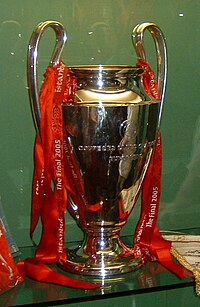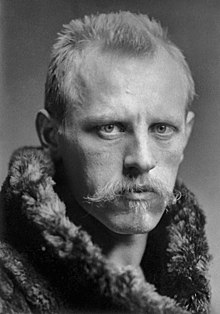Portal:Europe
| Main | Geography | Projects |
|
|
Europe is a continent located entirely in the Northern Hemisphere and mostly in the Eastern Hemisphere. It comprises the westernmost peninsulas of the continental landmass of Eurasia, and is bordered by the Arctic Ocean to the north, the Atlantic Ocean to the west, the Mediterranean Sea to the south, and Asia to the east. Europe is commonly considered to be separated from Asia by the watershed of the Ural Mountains, the Ural River, the Caspian Sea, the Greater Caucasus, the Black Sea, and the waterways of the Turkish Straits. Although much of this border is over land, Europe is generally accorded the status of a full continent because of its great physical size and the weight of history and tradition.
Europe covers about 10,180,000 km2 (3,930,000 sq mi), or 2% of the Earth's surface (6.8% of land area), making it the second smallest continent (using the seven-continent model). Politically, Europe is divided into about fifty sovereign states, of which Russia is the largest and most populous, spanning 39% of the continent and comprising 15% of its population. Europe had a total population of about 741 million (about 11% of the world population), as of 2018. The European climate is largely affected by warm Atlantic currents that temper winters and summers on much of the continent, even at latitudes along which the climate in Asia and North America is severe. Further from the sea, seasonal differences are more noticeable than close to the coast.
The history of Europe concerns itself with the discovery and collection, the study, organization and presentation and the interpretation of past events and affairs of the people of Europe since the beginning of written records. During the Neolithic era and the time of the Indo-European migrations, Europe saw human inflows from east and southeast and subsequent important cultural and material exchange. The period known as classical antiquity began with the emergence of the city-states of ancient Greece. Later, the Roman Empire came to dominate the entire Mediterranean basin. The fall of the Roman Empire in AD 476 traditionally marks the start of the Middle Ages. Beginning in the 14th century a Renaissance of knowledge challenged traditional doctrines in science and theology. Simultaneously, the Protestant Reformation set up Protestant churches primarily in Germany, Scandinavia and England. After 1800, the Industrial Revolution brought prosperity to Britain and Western Europe. The main European powers set up colonies in most of the Americas and Africa, and parts of Asia. In the 20th century, World War I and World War II resulted in massive numbers of deaths. The Cold War dominated European geo-politics from 1947 to 1989. After the fall of the Iron Curtain, the European countries grew together.
The culture of Europe is rooted in the art, architecture, film, different types of music, economic, literature, and philosophy that originated from the continent of Europe. European culture is largely rooted in what is often referred to as its "common cultural heritage".
The economy of Europe comprises more than 744 million people in 50 countries. The formation of the European Union (EU) and in 1999, the introduction of a unified currency, the Euro, brings participating European countries closer through the convenience of a shared currency and has led to a stronger European cash flow. The difference in wealth across Europe can be seen roughly in former Cold War divide, with some countries breaching the divide (Greece, Estonia, Portugal, Slovenia and the Czech Republic). Whilst most European states have a GDP per capita higher than the world's average and are very highly developed (Liechtenstein, Luxembourg, Monaco, Andorra, Norway, Sweden, Denmark, Netherlands, Switzerland, United Kingdom, Ireland, Germany), some European economies, despite their position over the world's average in the Human Development Index, are poorer.
Featured article -
Liverpool Football Club is a professional association football club in Union of European Football Associations (UEFA) competitions. Since 1964, they have won fourteen European and Worldwide trophies, more than any other British club. These consist of the UEFA Champions League (formerly known as the European Cup) six times, the UEFA Europa League (formerly the UEFA Cup) three times, the UEFA Super Cup four times and the FIFA Club World Cup once.
Qualification for European competitions is determined by a team's success in its domestic league and cup competitions from the previous season. Liverpool competed in European competitions for 21 consecutive seasons until the 1985 European Cup final, the occasion of the Heysel Stadium disaster, following which the club was banned from European competitions for six seasons. Since being readmitted in 1991, they have qualified for the UEFA Champions League (the successor to the European Cup) fifteen times, the UEFA Europa League (the successor to the UEFA Cup) twelve times, and the (now-defunct) UEFA Cup Winners' Cup twice. (Full article...)
Featured location -
Trafford is a metropolitan borough of Greater Manchester, England, with an estimated population of 236,301 in 2022. It covers 106 square kilometres (41 sq mi) and includes the area of Old Trafford and the towns of Altrincham, Stretford, Urmston, Partington and Sale. The borough was formed in 1974 as a merger of six former districts and part of a seventh. The River Mersey flows through the borough, separating North Trafford from South Trafford, and the historic counties of Lancashire and Cheshire. Trafford is the seventh-most populous district in Greater Manchester.
There is evidence of Neolithic, Bronze Age, and Roman activity in the area, two castles – one of them a Scheduled Ancient Monument – and over 200 listed buildings. In the late 19th century, the population rapidly expanded with the arrival of the railway. Trafford is the home of Manchester United F.C. and Lancashire County Cricket Club, as well as Altrincham F.C. and Trafford F.C.. The Imperial War Museum North, opened in 2002, is located in the borough. (Full article...)
Featured portrait
 |
In the News
- 14 February 2024 – Russian invasion of Ukraine
- Crimea attacks
- Ukraine claims to have sunk the Russian ship Tsezar Kunikov off the coast of Katsiveli, Crimea. A video appears to show the vessel being struck with unmanned surface drones. (Radio Free Europe/Radio Liberty)
- 13 February 2024 – Estonia–Russia relations
- Prime Minister of Estonia, Kaja Kallas, is reportedly placed on the Russian Interior Ministry's register of wanted people due to the country's removal of Soviet War Memorials, making Kallas the first known government leader to be added to a wanted list by Russian authorities. (The Guardian)
- 12 February 2024 – Israel–Hamas war
- Israel–Netherlands relations
- A Dutch appeals court orders a suspension of exports of F-35 jet parts to Israel within the next seven days over concerns that the aircraft parts are being used to commit serious violations of international humanitarian law. Prime Minister Mark Rutte says that the government will appeal the suspension. (Reuters)
- 12 February 2024 – Israel–United Kingdom relations
- British Foreign Secretary David Cameron announces sanctions against four Israeli settlers for engaging in extremist violence towards Palestinians in the occupied-West Bank. (Al Jazeera)
Updated: 16:33, 14 February 2024
Categories
Featured biography -
Fridtjof Wedel-Jarlsberg Nansen (Norwegian: [ˈfrɪ̂tːjɔf ˈnɑ̀nsn̩]; 10 October 1861 – 13 May 1930) was a Norwegian polymath and Nobel Peace Prize laureate. He gained prominence at various points in his life as an explorer, scientist, diplomat, humanitarian and co-founded the Fatherland League.
He led the team that made the first crossing of the Greenland interior in 1888, traversing the island on cross-country skis. He won international fame after reaching a record northern latitude of 86°14′ during his Fram expedition of 1893–1896. Although he retired from exploration after his return to Norway, his techniques of polar travel and his innovations in equipment and clothing influenced a generation of subsequent Arctic and Antarctic expeditions. He was elected an International Member of the American Philosophical Society in 1897. (Full article...)
Featured picture
 |
Related portals
Major Religions in Europe
Northern Europe
Western Europe
Central Europe
Eastern Europe, Balkans and Caucasus
Southern Europe
Featured panorama
 |
Topics
Associated Wikimedia
The following Wikimedia Foundation sister projects provide more on this subject:
-
Commons
Free media repository -
Wikibooks
Free textbooks and manuals -
Wikidata
Free knowledge base -
Wikinews
Free-content news -
Wikiquote
Collection of quotations -
Wikisource
Free-content library -
Wikispecies
Directory of species -
Wikiversity
Free learning tools -
Wikivoyage
Free travel guide -
Wiktionary
Dictionary and thesaurus



























